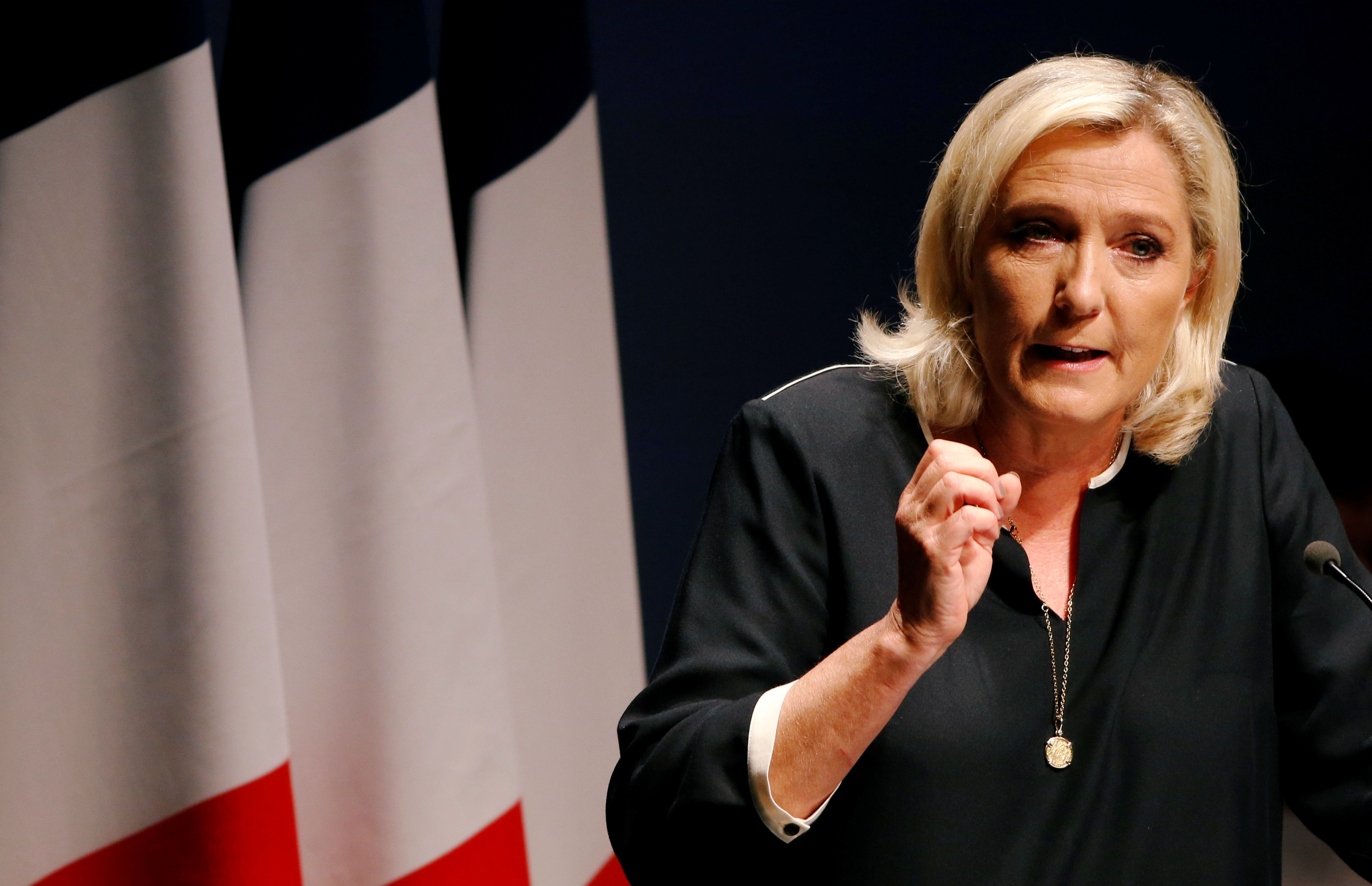
The discussion about the election chances of Le Pen and RN has revived in France after the publication of a survey by Harris Interactive at the end of January 2021 that showed that if the second round of the presidential elections were held in January 2021, Macron would win by only four points (52:48). In the first round, Le Pen could even count on a slight advantage over the incumbent (26-27:23-24, depending on the participation of other candidates). Government officials saw the poll as an opportunity to warn opponents of the far-right that a Le Pen victory was possible.
Macron’s supporters, however, may be deliberately exaggerating the threat from Le Pen to make it difficult for other candidates (centre-right or centre-left) to reach the second round. It is a common belief that the high polling for the RN leader results from the tense situation caused by the pandemic and the avoidance of controversial topics by Le Pen herself in the last year. After losing the presidential election in 2017, Le Pen has not moved away from focusing on moderate voters and has limited her public speaking because of poor assessments of her debate with Macron before the second round. A side effect of Macron’s treatment of Le Pen as his main opponent is the consistent shift of the ruling camp’s rhetoric rightward.
Le Pen’s Chances
The results of the first round of the 2017 presidential election and the scale of the “yellow vests” protests confirmed the existence of a broad protest electorate that may pose a threat to moderate parties. Since taking over nominal leadership of the far-right from her father Jean-Marie Le Pen in 2011, Marine Le Pen has been trying to attract as many voters as possible who do not identify with the right but are dissatisfied with the effects of globalisation and economic change. As many as 40% of Le Pen’s voters are blue-collar workers who otherwise would vote for leftist candidates. The main competitor in consolidating the protest electorate is Jean-Luc Mélenchon’s populist-left Unbowed France party.
It is much more difficult for the far-right to a attract new conservative electorate, such as pensioners and small business owners. The overemphasis on cultural conflict over immigration hurt Le Pen and RN among these groups. Paradoxically, an opportunity in this context seems to be for Le Pen to turn Macron towards the right and force him to focus on identity issues such as the fight against Islamic extremism and scepticism of immigration. The government for its part would use these issues to pull away extremist and moderate right-wing voters from RN and Le Pen.
In the fight over this electorate, Le Pen replies that Macron is just adopting concepts her party has been advocating for a long time. During a debate on “Islamic separatism”, the RN has been trying to portray itself as constructive opposition supporting the government’s proposals that corresponded to its programme. At the same time, RN refers to several issues as the most important, including deindustrialisation, capital outflow, excessive taxation, and bureaucracy, which are brought on—in the rhetoric of the RN—by France’s “submission” to the EU.
Macron and Le Pen are competing for the right-wing voter because of a decline in the importance of the moderate-right, which is reflected in the lower results of the Republicans (LR). For the far-right, the next test of its tactics to gain centrist voters will be the regional elections scheduled for June 2021 in which the RN lists include people associated with the Gaullist right from the times of Jacques Chirac and Nicolas Sarkozy.
The rivalry for the right-wing electorate is particularly visible in the field of foreign policy. This is favoured by sovereignist moods among the society. Le Pen claims Macron lacks credibility as a defender of the national interest because in the 2017 campaign he presented himself as a supporter of a federal Europe. At the same time, the far-right leader abandoned her proposals that France leave the EU and the eurozone in order not to scare voters who are reluctant to such radical changes. Taking advantage of the anti-American attitude of some of the French, Le Pen is more determined in criticising NATO and undermining the sense of France’s participation in the Alliance.
The attitude towards Russia may also become the topic of the upcoming election campaign. Despite Russian interference in France’s previous presidential campaign and the conflicting interests of both countries in different parts of the world, the French political class believes that good relations with Russia are an asset in the eyes of voters. Le Pen’s electorate discounts reports of a loan taken by the RN from a Czech-Russian bank, accepting the explanations of the leader, who presents herself as a victim of a boycott by the French financial sector.
Challenges on the Way to Power
Majoritarian representation based on two rounds of voting to the National Assembly requires a party to have coalition skills, which has so far prevented the RN from gaining a large parliamentary representation. A protest alliance, which would bring together the far-left and the far-right, seems unlikely, and attempts to make contacts between the moderate-right and the RN are fought by the LR leadership. A group of Gaullist politicians who decided to support Le Pen in 2017 paid for it with their marginalisation.
The far-right is just as bad in indirect elections to the Senate due to its weak roots in local government. Its low presence in parliament obstructs contact with voters and makes it easier for opponents to present the RN as an anti-systemic force. RN’s largest representation among French parties in the European Parliament could be an asset, but the role of MEPs in the country’s debate is modest.
A consequence of the weakness of the RN in local and central government is the limited ability to attract competent staff. People who decide to cooperate with the RN as experts do so anonymously. Le Pen herself is still burdened with the image of an incompetent person who loses crucial debates. The party has barely been visible during the pandemic, and Le Pen's criticism of the government regarding vaccine distribution or restrictions has not seemed convincing compared to the scale of the state’s involvement in fighting the pandemic and saving the economy.
Moreover, the RN is shaken by schisms. A particular threat to Le Pen is the conflict with her niece and former RN activist Marion Maréchal, who may want to form her own ultraconservative party in the future, with the support of Jean-Marie Le Pen, who is at odds with his daughter. Even Macron’s entourage remains in contact with Maréchal to encourage her to engage in public activity against the RN.
Conclusions and Prospects
Despite good polls, Le Pen still has little chance of winning the presidential election. The same goes for the RN in increasing its parliamentary representation. Le Pen owes the high ratings to her departure from the most radical postulates and the weariness of the French with Macron’s hyperactivism. In the immediate pre-election period, this tendency may reverse when the entire political elite once again forms a so-called “republican blockade” against the far-right. The LR’s strategy also will be an important factor: the moderate-right may pull away some voters from the RN before the regional elections. Le Pen may also face a strong LR presidential candidate, such as Michel Barnier.
In the long run, the attempt to soften its image to try to attract a wider range of voters tired of the current establishment may pay off for the RN. The key to greater presence in political life could be a change in the electoral law to the National Assembly (also backed by Macron’s centrist allies) and encouraging young intellectual elites to openly cooperate with the party. This is facilitated by the gradual convergence of the RN rhetoric and that of the current government around cultural issues.
Despite the slim chances of winning the elections, the views of Le Pen and the RN play an increasingly important role in French foreign policy (dialogue with Russia, aversion to the U.S. and NATO, France’s assertiveness in the EU). Regardless of the result of the presidential and parliamentary elections in 2022, these tendencies are expected to intensify, which is unfavourable also from the point of view of Polish interests.




